Jeff Beck
Albums reviewed on this page: Truth,
Beck-Ola, The
Rod Stewart Album,
Rough and Ready, The Jeff Beck
Group,
Blow by Blow, Hummingbird,
Diamond Nights, Wired, There
and Back.
Out of the famous trio of Yardbirds guitarists, Jeff Beck
seems to
wind up with the short end of the stick. While Eric Clapton
may
have found success with Cream and a solo career and Jimmy Page
founded Led Zepplin, Beck took a different path. Founding his
own group after leaving the Yardbirds, Beck was one of the early
heavy metal pioneers with his first few albums, influencing groups
like Led Zepplin. Then Beck moved towards a jazz-fusion
style,
which aptly displayed his vast technical prowess, culminating in two
well regarded instrumental albums, Wired and Blow
by Blow.
Beck then began to record more sporadically through the late 70s and
80s. Fortunately it appears that he is picking it up once
again, releasing albums in the past few years using a techno beat to
back his playing. I have seen Beck in concert and he is the
most impressive guitar player I've ever seen - his technique is
amazing from slide to blues to jazz fusion. The man has a bag
of tricks that makes everyone else look one-dimensional.
I've reviewed two Hummingbird albums, as the band consisted
mainly
of the Mk II band, but they focused more on the groove.
Occasionally there are references to Gonzalez as well, which was a
collective band formed by Tench in the early 70s that also was all
about the groove and featured a large open roster of players.
The Jeff Beck Group Mk I: Jeff Beck
(guitar), Ron Wood
(bass), Rod Stewart (vocals), Mick Waller
(drums) and
Nicky Hopkins (piano). Waller
replaced by Tony
Newman for Beck-Ola.
The Jeff Beck Group Mk II: Jeff Beck
(guitar), Clive
Chaman (bass), Bob Tench (guitar), Cozy
Powell
(drums), and Max Middleton (keys).
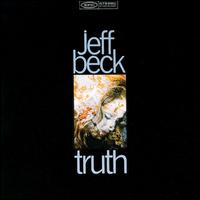 The
Jeff Beck Group: Truth (1968), ***1/2
The
Jeff Beck Group: Truth (1968), ***1/2
After
exiting
the Yardbirds mid-tour, Jeff Beck formed his own group.
Expanding on the Yardbirds' increasingly heavy blues approach, Truth
was one of the foundations for heavy metal: a sort of midpoint
between trad blues and Led Zeppelin. Strange as it sounds,
this
set of gravely voiced, riff enhanced blues covers predates and
foreshadows Led Zeppelin. It has some
problems, mainly a
lack of original songwriting, and Rod Stewart's vocals.
Although Stewart is tolerable occasionally, he annoys me to an
unbelievable extent. But Truth's rather
odd collection
of songs is a bit of a weakness, as Beck covers everything from his
last big Yardbirds hit "Shapes of Things", to "Ol' Man
River", to Ravel's Bolero, to a solo acoustic version of
"Greensleeves". But the album's redeeming factor is
Beck's playing, which permeates every track with loud interesting
leads. The best moment of the album is the closing wah-wah
masterpiece "I Ain't Superstitious". John Paul Jones
appears, and Jimmy Page contributes a song.
Sadly, despite
the enormous amount of talent in the group, their sound was largely
expanded on by Led Zeppelin with greater success.
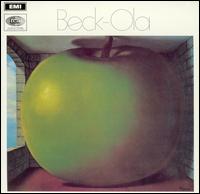 The
Jeff Beck Group: Beck-Ola (1969), ***
The
Jeff Beck Group: Beck-Ola (1969), ***
Beck
again
could not come up with any outstanding material, so Beck-Ola
is almost really good. Nothing really stands out either
way.
Most songs have the same approach-- hard blues --this time applied to
two Elvis covers and a couple of decent originals. Beck
spends
most of his time delivering the same type of leads, but also plays a
lot of whacko guitar work as well ("The Hangman's Knee").
The only different tracks are Hopkins' "Girl from the Mill
Valley", a mid-tempo piano instrumental, and the overlong "Rice
Pudding", again slower, but with Beck messing around his guitar
while everyone backs him up. The sole catchy song is "Plynth
(Water Down The Drain)" which is short, and has a nice
rhythm.
Otherwise, nothing new, with Stewart's vocals as annoying as
always.
Hopkins on keyboards really does help, but Newman isn't as strong a
drummer as Waller. If you liked the previous album, go for
it.
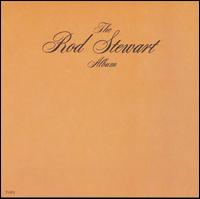 Rod
Stewart: The Rod Stewart Album (1969), ***
Rod
Stewart: The Rod Stewart Album (1969), ***
This
is the
best place for Rod right now, as he uses many of the same musicians
as the first incarnation of the Jeff Beck Group. Just in case
you were wondering, I really dislike Stewart's voice. But, it
is effective in the right circumstances. Those circumstances
turned out later
on to be boozed-up Stones-style rock, but on
The Rod
Stewart Album he had not settled on one sound. Not
a bad
thing, but kind of unexpected. Almost equal in importance to
Stewart himself on this album is Ron Wood,
doing great
bass work, and some guitar as well. For example, Stewart's
cover of "Street Fighting Man" would not have worked
without Wood's excellent bottleneck guitar work. Of course,
it
isn't as good as the original, but it is the kind of material for
which Stewart's voice was made. What is his voice?
Kind
of a shouty gravely blues voice it seems, and when he does this (with
a little luck) it works ("Blind Prayer" for one). But
he gets contemplative and slower (and softer) on "Dirty Old
Town", and the acoustic ballad "Man of Constant Sorrow",
with Rod on guitar. Many of these experiments (for that's
what
they were) do not come off right; "An Old Raincoat Won't Ever
Let You Down" sounds silly, and "I Wouldn't Change a Thing"
is another contemplative song that stops, starts and uses not only
Keith
Emerson,
but has the Producer Lou Reizner singing some lines. The only
thing close to a classic on The Rod Stewart Album is
"Handbags
and Gladrags", a slower piano-based number written by Manfred
Mann vocalist Mike D'Abo (aka King Herod in the original Jesus
Christ Superstar). Granted, one might ask why D'Abo
didn't
sing it himself, and instead played piano, but who knows? As
for the song, it is another sad, looking back song, augmented with
woodwinds. Yeah, woodwinds do not matter, but I thought it
was
a nice touch. The verdict? Rod's debut is a
grabbag, with
some good songs, and some boring ones. The not-so-at-this-time all
star cast includes future Ron Wood (of course), Micky Waller (toned
down a bit as well), Ian McLagan, a Nice-era Keith Emerson, Manfred
Mann's vocalist playing piano for a number, and two members of the
group Steamhammer, Martin Quittenton and Martin Pugh, on
guitars.
Produced by Lou Reizner.
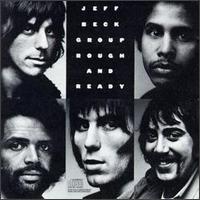 The
Jeff Beck Group (Mk II): Rough and Ready (1971), ****
The
Jeff Beck Group (Mk II): Rough and Ready (1971), ****
Having
entirely replaced his backing band, Beck embarked on an almost
entirely new sound. It's faster, syncopated, and (dare I say
it), slightly funky. Gone are the Elvis covers and hard rock
approach; instead, new singer Bob Tench comes close to oversinging
("Jody" is the only time he does) but is a heck of a lot
easier to listen to. But the biggest change is the addition
of
Max Middleton on keys - his role appears to be almost as big as
Beck's. That is not to diminish Beck's talents, which he
displays admirably with blistering slide work ("Short Business")
or blues. Beyond that, "Raynes Park Blues" is a test
run for Beck's later fusion work that does not quite gel, but still
has some nice Peter Green-esque moments in it. My personal
favorite is "New Ways/Train Train", whose first half sounds
exactly like Stevie Wonder, and serves a showcase for Beck's
talent.
With only a few weak spots and nothing embarrassing, this album is
great.
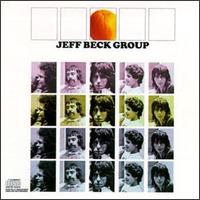 The
Jeff Beck Group (Mk II) (1972), ***
The
Jeff Beck Group (Mk II) (1972), ***
The
cover
photos tell all about this album: Tench and Powell look like they are
having a great time, Chamen looks skeptical, and Middleton and Beck
look bored. To tell the truth, there is plenty to feel bored
about on this album. Instead of recording Beck's own tunes
(he
wrote or co-wrote everything on the previous album), he accounts for
only about half of the tracks. When they play a Stevie Wonder
song it is thankfully good ("I Got To Have a Song" whose
chorus sticks in my head), likewise for a Dylan cover ("Tonight
I'll Be Staying Here With You"), but this album has a good
amount of tripe. Beck's guitar skills can lift almost any
track
(his own rather ordinary "Ice Cream Cakes" for one), but
songs like the annoyingly dumb pop "Glad All Over" are
still bad. Plus, Tench
tried to make up with
increasingly overwrought vocals whatever
musical energy the others lacked. Beck does get into a groove
on "Going Down," simply busting into a cool solo (Middleton
also has a nice piano into). But they only time the group shines is
on "Highways" and the instrumental "Definetely Maybe",
with some amazing guitar work (and good Middleton
contributions).
The rhythm section does a great job like last album; too bad the
songs were not as good. Produced by Steve Cropper (who
co-wrote
the rather weird "Sugar Cane").
Beck,
Bogart and Appice (1973)
A
power
trio with members of Vanilla Fudge. Supposedly terrible.
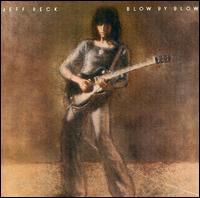 Blow
by Blow (1975), ****1/2
Blow
by Blow (1975), ****1/2
Hello,
vocal-free fusion. The musical concept behind Blow
by Blow
is simple, but its exercise is stunning. Each track has a
main
musical theme which is then expanded upon, or transmuted through
soloing within a set chord framework. If that sounds obscure
then think about it this way - take a series of notes, say two lines
of a song, and then have it repeat (although not strictly) with each
chord change. If these notes are too short it becomes riffing
in a lead instrument, or if slower a rhythm line (how many bass lines
are repetitive?). What this album does is take that musical
motif and then solo around it, expand on it, abandon it and later
return, but never forget it. It isn't anything really new -
the
most famous jazz album of all time, Miles Davis's Kind of Blue,
has tracks built around this idea. But adopting it towards
rock
was fairly groundbreaking, even if it was only an adaptation.
This translates into fairly hard-edged rock soloing within a jazz
structure, frequently propelled along by a funk beat. Or at
least those are my notes for the first track, "You Know What I
Mean". Both Beck and Middleton keep these themes going,
while taking time to let loose within the chord structures of the
songs. Sometimes the musicians cannot overcome the original
musical theme (the cover of the Beatles's "She's a Woman"
does not really go anywhere, even if it goes there with a talkbox),
but some others are so good that you don't need much else
("Scatterbrain" which due to the speed is more of a riff,
but that combined with the chord sequence make it a treat).
Beck's playing strengths are his multitude of ideas, style shifts
(Shaft-like, light jazz, slide), but most importantly his ability to
coax emotion out of his playing when he wants to ("Cause We've
Ended as Lovers" where the guitar pleads for its life, or the
forlorn "Diamond Dust"). Middleton is something more
than a rhythm player, but less than a second lead instrument; he
co-wrote most of the songs with Beck and journeys back and forth
between these two roles throughout. His reliance on more
electric piano puts him in line with Beck's friend Stevie Wonder on
some tracks, and Wonder even wrote two of the tracks ("Cause
We've Ended as Lovers" and "Thelonius"), but Beck's
sound is his own. The rhythm section is just that - Phil
Chenn
(bass) and Richard Bailey (drums) from groove band Gonzalez provide
good support, with Bailey not being a clattering drummer which is
nice for a change. Overall this album is fascinating if not
immediately so, and Beck's playing is a treat. Unfortunately,
this sort of music mutated into things like soft jazz and muzak,
which this albums may superficially resemble, but underneath there's
a whole lot of musical integrity. Produced by George Martin,
that George Martin.
 Hummingbird:
Hummingbird (1975),
**1/2
Hummingbird:
Hummingbird (1975),
**1/2
A
forgotten spin-off, this band had Tench, Middleton and Chaman and
attempted to build on the good groove that Beck's group had.
The funny thing is that because Middleton stays with his trademark
electric piano it sounds more like Beck's post-Tench work. There
really is a good dynamic working here - a bouncing rhythm with the
same light funky touches that Beck worked on top of. Former
Steven Stills drummer Conrad Isidore wrote most of the material, and
he adds a distinct reggae flair to his drumming and songs ("Ocean
Blue", "Island of Dreams") but never comes up with
anything beyond pleasant. Both he and guitarist Bernie
Holland
are not as flashy as the main brand players, and Holland in
particular is in an impossible role. He usually stays in the
background playing rhythm, but did write the most overtly
Beck-influenced track, "Horrors". His soloing echoes
Beck enough to make it amusing to hear (he plays fast scale-based
notes while using a wah-wah pedal) but lacks Beck's innovation of
emotion. "I Don't Know Why I Love You" is an attempt
to recreate the emotional masterpieces of Beck, and Holland certainly
tries. The positive thing is that the group really plays like
a
group, nobody is really blocking out anyone else, although this does
give Tench plenty of room to grandstand. Hummingbird
is
not a bad album, but more similar to the rock-oriented Jeff Beck
Group than Beck's contemporary fusion work I am not sure who
the audience was that they were catering to was, as only one good
track does not echo Beck (Isidore's pleasant "Such A Long Ways"
which he sings, not Tench), and all this really does is make me want
to listen to the real thing. Produced by the group and Ian
Samwell.
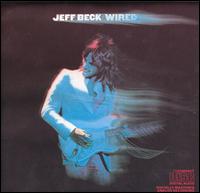 Wired
(1976), ****
Wired
(1976), ****
Beck
finally
ditched vocals with Blow by Blow, and
squarely
focused on his fusion playing, and Wired continues this with Beck usually trading solos with either
Middleton or ex-Mahavishnu Orchestra member Jan Hammer. But
Beck's variety of tones and flexibility of style give his playing an
amazing emotional and atmospheric depth (the tender acoustic "Love
is Green"). Along with this, Wired's
songs also
have different feels, as with the mysterious intro to "Come
Dancing" or the vaguely 50s feel to Jan Hammer's "Blue
Wind". Each song seems to have a central motif, not a
riff, that gets echoed throughout. I could do without
Hammer's
synth tones most of the time (especially on "Blue Wind"
where he floppily drums as well). Middleton is the only
holdover from Beck's previous band, but the new rhythm section of
Richard Bailey (drums) and Wilbur Bascomb (bass) is
admirable.
Narada Michael Walden, who plays some drums and piano, wrote most of
the songs and did a heck of a job. But he didn't write the
best, a cover of Mingus's "Goodbye Pork Pie Hat" which is
really mind blowing. Produced by George Martin.
Hummingbird: We
Can't Go On
Meeting Like This (1976)
Recorded
with a different lineup.
Live with
the Jan Hammer Group
(1977)
No
comment.
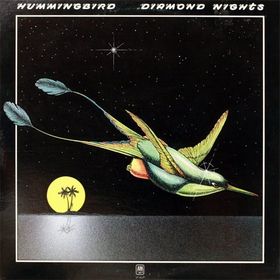 Hummingbird:
Diamond Nights (1977), ***
Hummingbird:
Diamond Nights (1977), ***
After
spending too much time researching Hummingbird, I can conclude the
following: 1) Tench, et al. have an interesting history, and
2)
You really don't want to know about it. Hummingbird was all
about the groove underneath, and they continued to do just that with
Diamond Nights. You can imagine this fit
fairly well
into the whole disco thing, and while not entirely given over to
disco, the band did get some full-blown production ("Madatcha",
"Spirit"). Specifically, female backing vocals,
horns, strings, Latin percussion etc, which balances out Tench's
vocals. Funk/jazz session drummer king Bernard Purdie lays
down
a steady beat, and they go from there. Only when they slow
down
or get quiet does it get hokey ("She Is My Lady", "Losing
You"). Middleton is the only real soloist, and he gets an
appropriate spotlights, the Latin jazz "Anaconda" and
"Anna's Song", otherwise Diamond Nights is one
dancing groove after another. New guitarist (and former
Gonzalez member) Robert Ahwai pretty much stays in the background,
and Tench plays some unremarkable lead guitar. There may be a
definite lack of songwriting but just sit back (or dance) and enjoy
the groove. Produced by Ian Samwell and the band
again.
Did I use the
word "groove" enough?
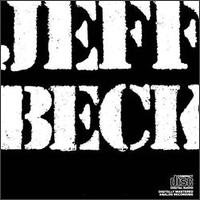 There
& Back (1980), ***1/2
There
& Back (1980), ***1/2
With
the
exception of a few Hammer tracks, Beck used an entirely new backing
band led by keyboardist Tony Hymas and drummer Simon Phillips, who
also wrote most of the songs. Hammer is up to his old thing -
a
couple of songs cluttered up with synths (the disco-ish "You
Never Know" which buries Beck), and a rather vanilla attempt to
channel Stevie Wonder ("Too Much To Lose"). The new
guys do not attempt to overshadow or duel Beck usually; instead, they
have a more contemporary atmospheric and level sound ("The
Pump"). That is not to say that they are not great
musicians in their own right, and the breakneck "Space Boogie"
features some outstanding drumming by Phillips, for example.
The album's focus is rightly on Beck, and he gets plenty of space to
play and deliver some fascinating singing slide work ("El
Becko"), along with his other usual moods (mournful in "The
Final Peace", or "The Golden Road", another Stevie
Wonder sound-alike, but excellent). Granted, some tracks go
on
for long periods of time, but the songs themselves are
strong.
Another dazzling display of the Beck comet, showing it hadn't lost
anything in his four year studio absence. Co-produced by Beck
and Ken Scott.
Etc...
I've been
used, so back to the Music page...
 The
Jeff Beck Group: Truth (1968), ***1/2
The
Jeff Beck Group: Truth (1968), ***1/2
 The
Jeff Beck Group: Beck-Ola (1969), ***
The
Jeff Beck Group: Beck-Ola (1969), ***
 Rod
Stewart: The Rod Stewart Album (1969), ***
Rod
Stewart: The Rod Stewart Album (1969), ***
 The
Jeff Beck Group (Mk II): Rough and Ready (1971), ****
The
Jeff Beck Group (Mk II): Rough and Ready (1971), ****
 The
Jeff Beck Group (Mk II) (1972), ***
The
Jeff Beck Group (Mk II) (1972), ***
 Blow
by Blow (1975), ****1/2
Blow
by Blow (1975), ****1/2

 Wired
(1976), ****
Wired
(1976), ****

 There
& Back (1980), ***1/2
There
& Back (1980), ***1/2